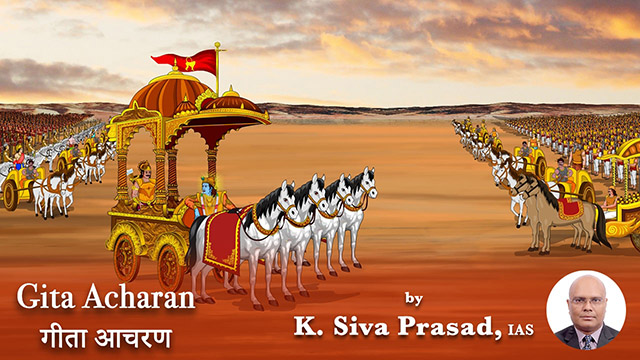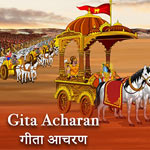
One of the common fears of humanity is about committing sins (𝙥𝙖𝙖𝙥). Every culture evolved around sin and the common belief is that all our sufferings are because of sins committed by us in this birth or the previous ones. Religions thrive on our guilt of committing sins. Even Arjun's despondency is because of his belief that he will incur sin by slaying his elders, teachers and relatives. That's why Krishna elaborates on this issue on various occasions in the Bhagavad Gita.
Firstly, 𝙥𝙖𝙧𝙖𝙢𝙖𝙩𝙢𝙖 takes no account of anyone’s virtue or sin. It is the problem of human beings who are deluded as their knowledge is covered by 𝙢𝙤𝙝𝙖 (delusion or ignorance) (5.15). Secondly, one hoping for nought, with a controlled mind and body, doing mere bodily actions, incurs no sin (4.21). Even if we are the most sinful of sinners, we shall safely cross the sea of sin by the raft of wisdom (4.36). The wisdom is realising ‘that’ by which we will see all beings in the self (4.35).
Thirdly, for a 𝙠𝙖𝙧𝙢𝙖 𝙮𝙤𝙜𝙞, no sin would be committed if a 𝙠𝙖𝙧𝙢𝙖 is performed by keeping pleasure-pain; gain-loss; and victory-defeat with equipoise (2.38). Krishna calls this equanimity as 𝙥𝙖𝙧𝙖𝙢 𝙗𝙝𝙖𝙠𝙩𝙞 (supreme devotion) (18.54). Finally, Krishna says, "Abandon all 𝙙𝙝𝙖𝙧𝙢𝙖𝙨 and take refuge in Me alone. I will liberate you from all sins, grieve not" (18.66).
While learning addition, a kid may say that two plus two equals to five which can't be termed a sin. It is just ignorance. Similarly, a sin is merely an ignorant action due to knowledge being covered by 𝙢𝙤𝙝𝙖. One way to remove this ignorance is to light a candle of wisdom and another path is taking refuge in 𝙥𝙖𝙧𝙖𝙢𝙖𝙩𝙢𝙖. Suffering disappears once this is realised.
https://epaper.dailyworld.in/Details.aspx?id=158935&boxid=78089&uid=&dat=2025-02-09

